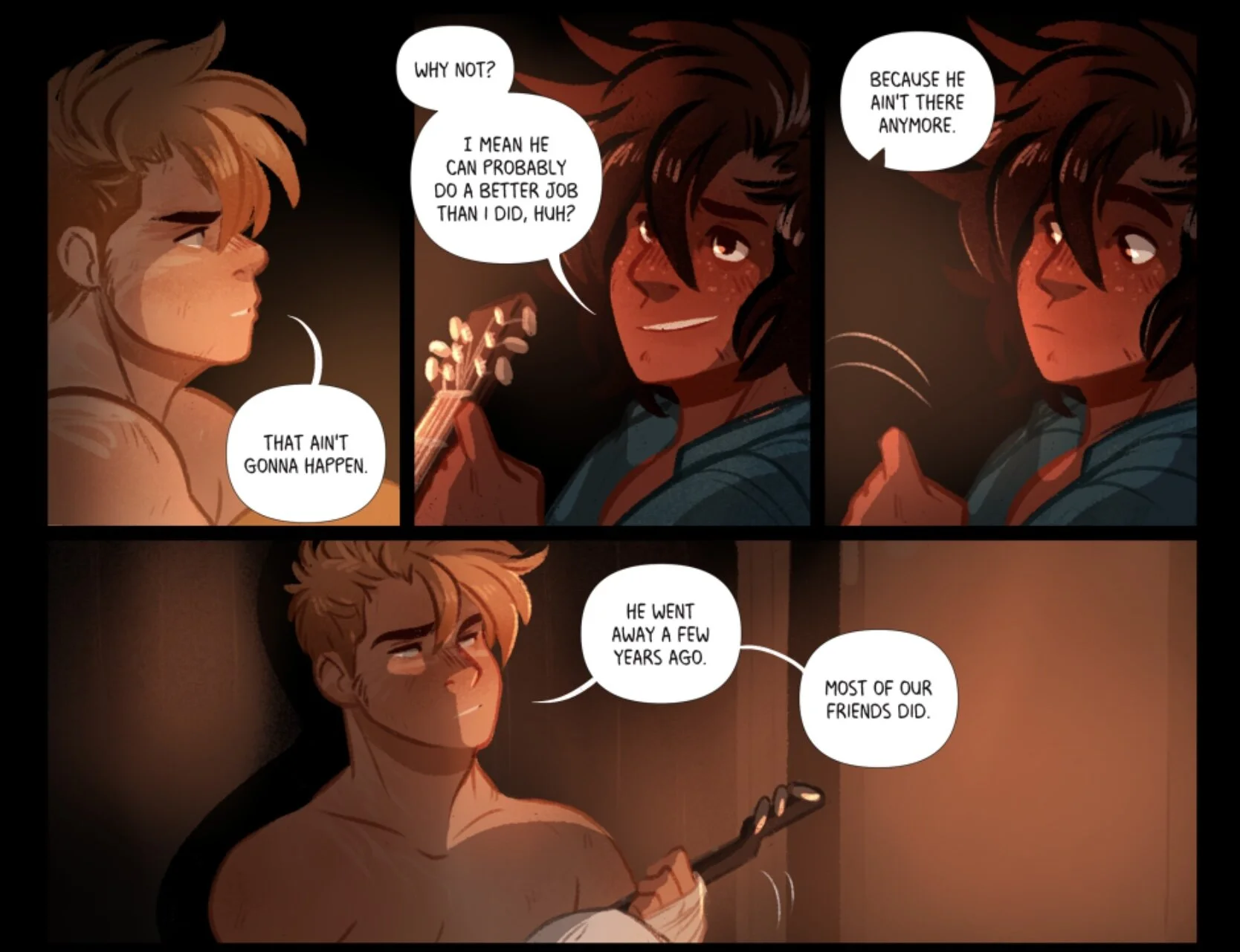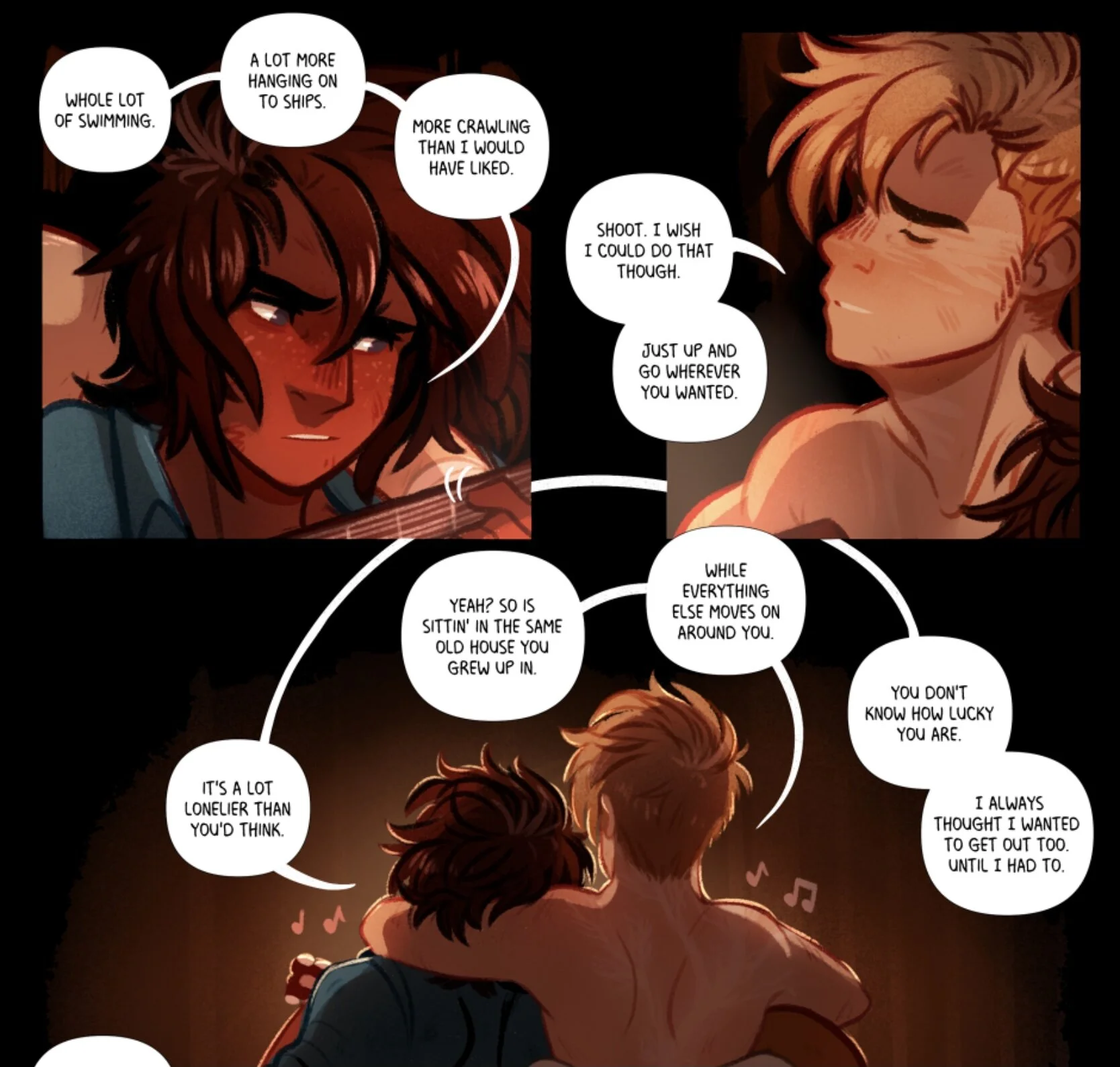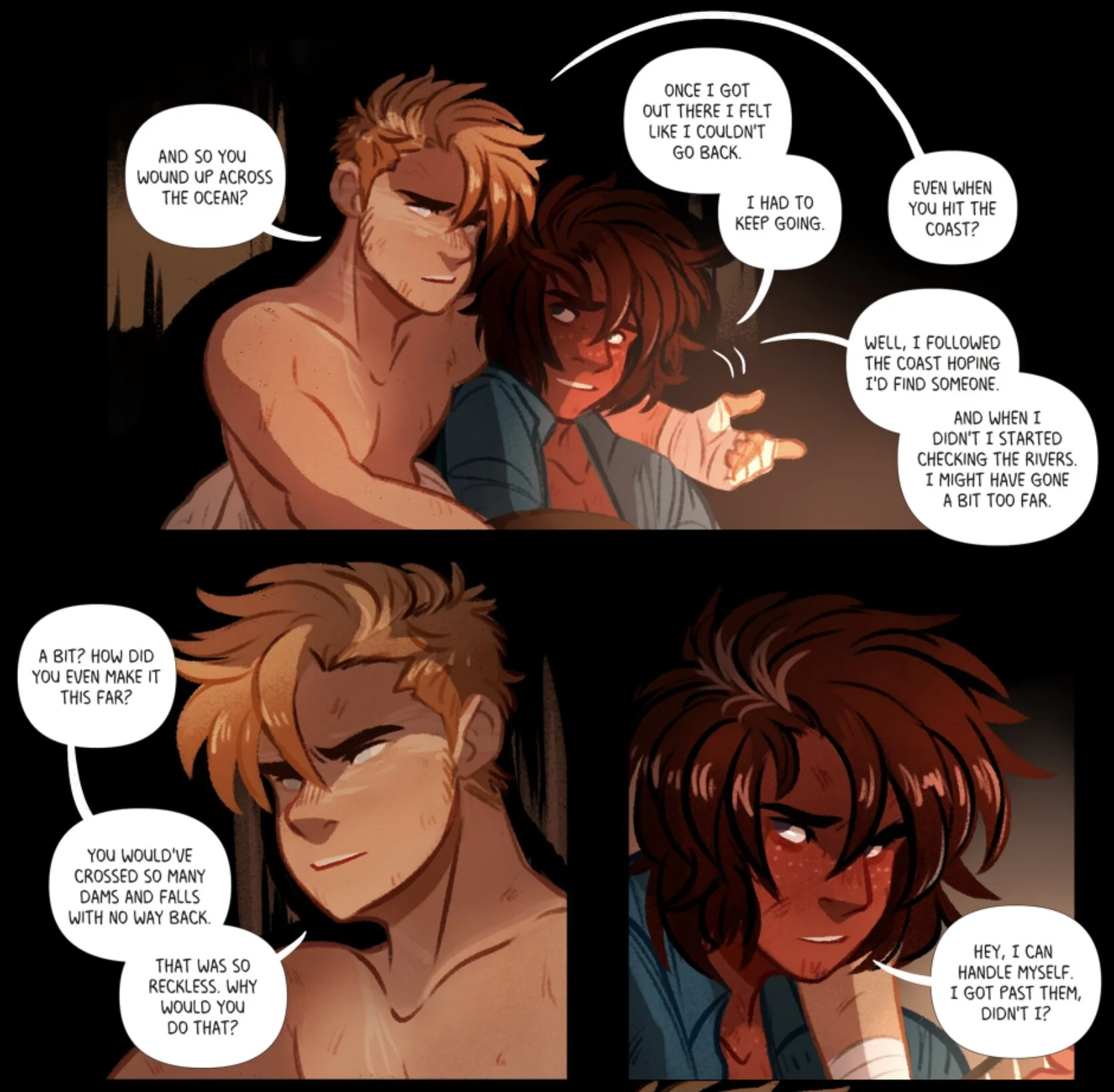Out of the Blue by Ari tells the story of guitar-playing, music-loving Felix and Mack, a fun-loving mermaid trapped in a water reservoir. One day, Mack finally musters up the courage to talk to Felix as he plays by his favorite spot by the reservoir. Felix, while enjoying the company, is understandably cautious around the mysterious boy who refuses to get out of the water, especially because Felix can’t see him. Mack, on the other hand, is relishing finally being able to talk to someone without hiding. After years of loneliness, prickly and guarded Felix and Mack slowly learn that they’re not all that different.
How do the dialogue and visuals develop the theme of isolation?
To get the discussion going, there’s another sub-query that should be explored first: is isolation a matter of choice or circumstance? For instance, a person can grow up with their family in an isolated place, circumstances a child has no say to. Eventually, this child will grow up and — ideally — will have the agency to chose whether to stay in insolation or join a larger community; this would be a matter of choice. With this perspective, the nature of isolation can vary throughout a person’s lifetime based on agency. Of course, there is another perspective: the harsher reality that choices are generally defined by circumstances. The range of possibility at one’s disposal is tied to the constraints of the circumstances at hand. In other words, you can only do so much with the hand that is dealt to you. Likewise, one’s circumstances can also blur the range of possibility, limiting what can even be conceived as possible, or how some people would put it: “I didn’t even know that was a thing.” Overall, this is the underlying theme developed in chapter 5 of Out of the Blue.
Credit: Ari
A four-panel page.
First panel: A close-up of Felix’s profiled face.
Felix: That ain’t gonna happen.
Second panel: A close-up of Mack holding the guitar.
Mack: Why not? I mean he can probably do a better job than I did, huh?
Third panel: A close-up of Mack having the guitar swiped from his hands, suddenly surprised.
Felix (off-panel): Because he ain’t there anymore.
Fourth panel: Felix has the guitar back in his hands, slightly downcast.
Felix: He went away a few years ago. Most of our friends did.
Credit: Ari
A three-panel page.
First panel: A close-up of Mack with Felix’s arm around him as they play the guitar, with a look of slight frustration on his face yet blushing from the contact.
Mack: Whole lot of swimming. A lot more hanging on to ships. More crawling than I would have liked.
Second panel: A close-up of Felix’s profiled face, eyes closed.
Felix: Shoot. I wish I could do that though. Just up and go wherever you wanted.
Third panel: A shot of Mack and Felix from behind. Felix’s left arm is around Mack’s as they keep playing the guitar together.
Mack: It’s a lot lonelier than you think.
Felix: Yeah? So is sittin’ in the same old house you grew up in. While everything else moves on around you.
Mack: You don’t know how lucky you are. I always thought I wanted to get out too. Until I had to.
Let’s start with the dialogue. Chapter 5 is where readers are given more detail into Felix’s and Mack’s stories, specifically details about their relationship to other people in their lives. Felix tells Mack that his closest friend moved away, just like most of their friends did, with clear resignation in his speech, an air of “I don’t blame them. Who would want to stay?” In the second group of panels, this feeling gets twinged by a bit of envy as Felix wishes he could do the same and just leave. For Felix, his isolation stems from his blindness, and it is easy to believe that he would have also left with his friends if he felt he could have. In Mack’s case, we have the complete opposite yet with similar circumstances to begin with. After being left behind by someone he cared about, Mack decided to swim and travel as far as he could, not even letting dry land stop him at points. In search of someone, he found himself isolated on a lake. The both envy the other, thinking the other’s circumstances are better, yet they slowly realize that their both extremes ended up meeting in the same place.
Credit: Ari
A three-panel page.
First panel: Felix and Mack are still sitting together. Mack is looking back at Felix as Felix firmly questions Mack’s choices.
Felix: And so you wound up across the ocean?
Mack: Once I got out there I felt like I couldn’t go back. I had to keep going.
Felix: Even when you hit the coast?
Mack: Well, I followed the coast hoping I’d find someone. And when I didn’t I started checking the rivers. I might have gone a bit too far.
Second panel: A close-up of Felix, brows furrowed in thought.
Felix: A bit? How did you even make it this far? You would’ve crossed so many dams and falls with no way back. That was so reckless. Why would you do that?
Third panel: A close-up of Mack, looking back at Felix, annoyed as being underestimated.
Mack: Hey, I can handle myself. I got past them, didn’t I?
Now, the visuals create a very sharp contrast with the stories at hand. As Felix and Mack open up more and more about how lonely they have felt, they slowly end up in each others’ arms. This is particularly poignant as this is the first time in the story where they deliberately come close to one another. There had been some contact before: Mack grabbed Felix to pull him into the water in the beginning, and when the dam broke, Mack held on to Felix to save him. It’s interesting to notice that Mack had always been the one to reach out, but at this point Felix is the one that told Mack to come closer. Regardless of the circumstances that lead to their isolation, both characters are incredibly lonely and yearning for affectionate contact. Their worlds are vastly different, and they might struggle to understand the other’s choices, but their loneliness is the same. Being left behind by men they both cared for and feeling stuck or aimless because of it are tropes that resonate with queer readers, and Felix and Mack’s heart-to-heart is a good example of how while the may details vary, the feelings are ultimately the same.


